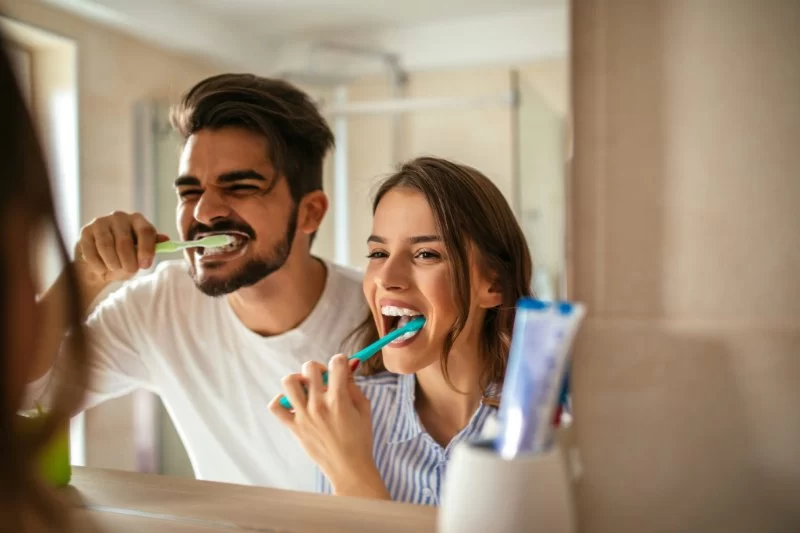
Understanding the Importance of Oral Hygiene
Maintaining good oral hygiene goes far beyond having a bright smile. Oral health is closely linked to overall health, influencing conditions such as heart disease, diabetes, and respiratory issues. In the United States, where sugary diets and busy lifestyles are common, developing consistent dental hygiene practices is essential. By learning how to get better oral hygiene through effective habits, you can improve not only your dental health but also your long-term wellness.
1. Building the Foundation with Brushing
Choosing the Right Toothbrush
One of the first steps in improving oral hygiene is selecting a proper toothbrush. Dentists often recommend a soft-bristled brush that can clean effectively without damaging enamel or irritating gums. For many Americans, an electric toothbrush can be an even better choice, as it provides consistent movements and ensures thorough cleaning in hard-to-reach areas.
Mastering Brushing Techniques
Knowing how to brush is just as important as doing it regularly. Angle the toothbrush at 45 degrees toward the gum line and use short, gentle strokes. Cover all surfaces—outer, inner, and chewing areas. Spending at least two minutes, twice daily, is a simple yet powerful routine that can dramatically reduce plaque and prevent cavities.
2. Flossing: The Overlooked Hero of Oral Health
Why Flossing Matters
Brushing alone cannot remove plaque and food particles stuck between teeth. Flossing once daily helps prevent gum disease, which affects nearly half of adults in the United States. Healthy gums are just as important as healthy teeth, and flossing is the key to keeping them strong.
Proper Flossing Technique
Gently guide the floss between each tooth, curving it around the tooth base in a C-shape and sliding it under the gumline. Avoid snapping the floss, which can damage sensitive tissues. For those who struggle with traditional floss, alternatives like floss picks or water flossers can provide easier solutions.
3. The Role of Diet in Oral Hygiene
Foods That Promote Oral Health
What you eat directly affects your teeth and gums. Crunchy vegetables like carrots and celery naturally help clean teeth, while calcium-rich foods such as milk and cheese strengthen enamel. Green tea, rich in antioxidants, has been shown to improve gum health as well.
Foods and Drinks to Limit
Sugary sodas, candy, and processed snacks remain among the leading causes of cavities in the U.S. Acidic drinks like coffee and citrus juices can erode enamel over time. Limiting these items while drinking plenty of water will protect your teeth and encourage natural saliva production.
4. Regular Dental Check-Ups
Why Professional Care Matters
Even with the best at-home care, professional cleanings and check-ups are irreplaceable. Dentists can remove tartar buildup and detect early signs of gum disease or oral cancer. Skipping visits often allows minor issues to develop into major problems.
How Often Should You Visit?
Most dental experts in the U.S. recommend seeing a dentist at least twice a year. However, those with chronic conditions like diabetes or a history of gum disease may need more frequent visits. Choosing a trusted provider like Family Dentistry Online ensures access to reliable advice and personalized care options.
5. Real-Life Stories That Highlight the Impact
The Busy Professional
Take Sarah, a 32-year-old marketing professional in New York. Constantly on the go, she often skipped flossing and snacked on sweets between meetings. After experiencing gum bleeding, she committed to a structured routine—switching to an electric toothbrush, using water flossers, and scheduling regular visits. Within a year, her gum health improved dramatically, proving small daily changes can make a big difference.
The Health-Conscious Retiree
John, a retiree in California, focused on nutrition and oral hygiene as part of his wellness journey. By prioritizing leafy greens, drinking water, and sticking to his brushing and flossing schedule, he not only avoided cavities but also kept his gums healthy well into his 70s. His story shows that it’s never too late to learn how to get better oral hygiene and reap lifelong benefits.
6. Lifestyle Habits That Influence Oral Hygiene
The Impact of Smoking and Alcohol
Smoking remains a leading cause of gum disease, bad breath, and oral cancer. Similarly, excessive alcohol consumption can dry out the mouth, increasing the risk of decay. Reducing or eliminating these habits significantly improves both oral and overall health.
Hydration and Saliva Production
A hydrated mouth is a healthy mouth. Saliva helps wash away food particles and neutralizes acids produced by bacteria. Drinking enough water daily supports this natural defense system and is one of the easiest ways to maintain good oral hygiene.
Final Thoughts on Better Oral Hygiene
Learning how to get better oral hygiene is about consistency, knowledge, and practical daily habits. From brushing and flossing properly to maintaining a healthy diet and scheduling dental visits, every small step adds up. Incorporating these practices into your routine ensures healthier teeth, stronger gums, and a confident smile for years to come.







 Arise Dental - Your Local Peoria Dentist4.0 (205 review)
Arise Dental - Your Local Peoria Dentist4.0 (205 review) Light Dental Studios of University Place4.0 (279 review)
Light Dental Studios of University Place4.0 (279 review) Dentists of South Pasadena4.0 (124 review)
Dentists of South Pasadena4.0 (124 review) Aurora Dental Care4.0 (153 review)
Aurora Dental Care4.0 (153 review) ClearChoice Dental Implant Center4.0 (383 review)
ClearChoice Dental Implant Center4.0 (383 review) Kansas City Dentures and Implants5.0 (15 review)
Kansas City Dentures and Implants5.0 (15 review) The Importance of Oral Health Education During Pregnancy for a Healthy Pregnancy
The Importance of Oral Health Education During Pregnancy for a Healthy Pregnancy Best Tips for Brushing Your Teeth Properly for Healthy Gums: Essential Techniques for Oral Health
Best Tips for Brushing Your Teeth Properly for Healthy Gums: Essential Techniques for Oral Health Why Skipping Dental Checkups Can Lead to Bigger Oral Health Problems
Why Skipping Dental Checkups Can Lead to Bigger Oral Health Problems Advantages of Porcelain Dental Restorations
Advantages of Porcelain Dental Restorations How Can Diabetes Cause Tooth and Gum Problems? Preventing and Managing Oral Health Issues
How Can Diabetes Cause Tooth and Gum Problems? Preventing and Managing Oral Health Issues Healthy Habits for Promoting Good Oral Health and Hygiene: Tips for a Healthy Smile
Healthy Habits for Promoting Good Oral Health and Hygiene: Tips for a Healthy Smile